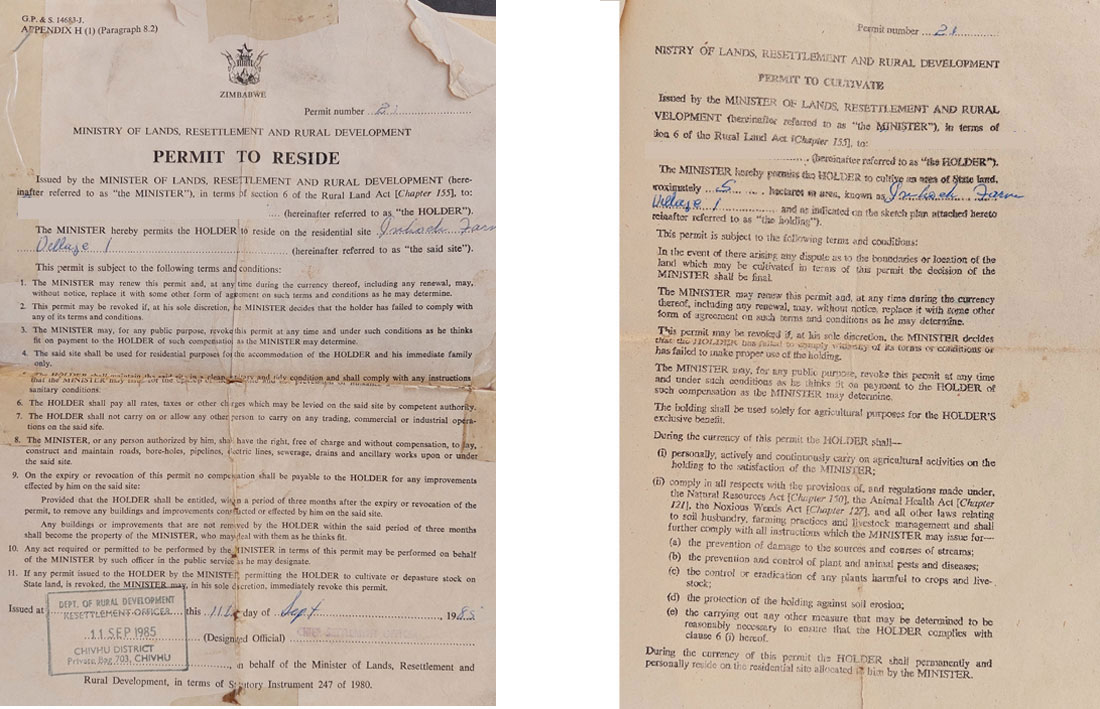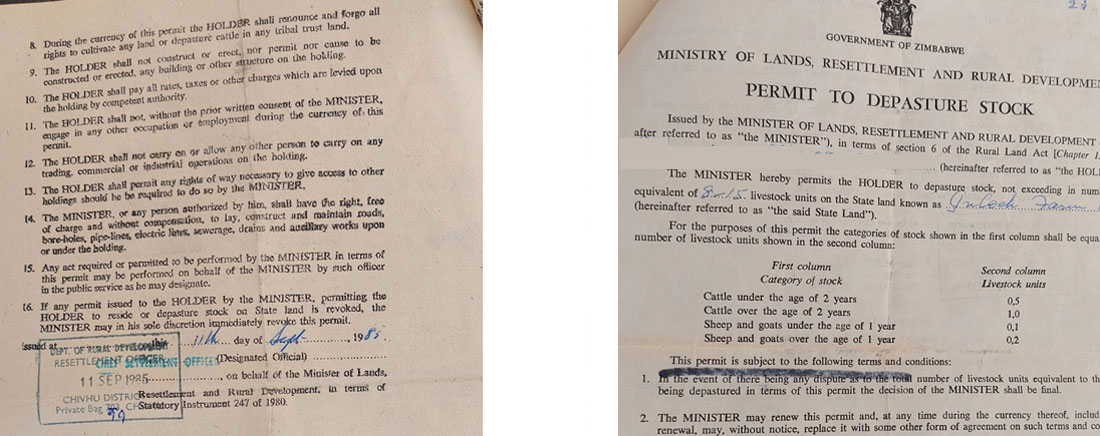

Unsecured land permits issued to farmers in 1984 at Inhoek farm vested all the powers in the Minister of Lands Resettlement and Rural Development

|
On Wednesday 14 February 2024, 12 villagers accused of illegally
occupying state land in Manhize appeared at the magistrate
court in Mvuma. The accused denied accusations labelled against
them before the prosecuting authority. The police officer who
took them to court didn’t have enough information about the
arrests. When contacted by the court to clarify circumstances
leading to the arrest of the villagers, neither the Officer in
Charge crime nor the Officer in Charge of Mvuma police station
were readily available to come to court.The prosecutor’s office
requested the villagers to return to the court on 20 February
2024.
Information gathered by CRD indicates that on Friday 9 February 2023, seven women with infants (1 month,1 year and 1 year 3 months) and 1 man were whisked from Mushenjere village of Inhoek farm in Manhize by 4 state security agencies and driven to Mvuma police station where they were detained for the night. The 8 were accused of illegally occupying state land in their village. In an interview with CRD, the villagers claimed that they were allocated land by ZANU PF through their former councillor and then District Party Chairman Raphael Mapete in 2016. Through this ZANU PF structure, a seven-member committee was chosen to allocate each person 50 x 50 metres of land in areas set aside for pastures. The accused persons are children of permit holders, whose parents got land from the government in 1984, a few years after Zimbabwe attained independence in 1980. The accused informed CRD that the arresting police officers had wanted them to lay the blame for occupying the land on their village head Mr John Mushore upon their arrival at the police station, a move they flatly rejected. Other villagers interviewed by CRD in Mushenjere highly suspected that former ZANU PF councillor Mapete, who lost ZANU PF elections for councillor, Eria Jemwa who wanted to be the village head and Chinese authorities at Dinson were behind the arrests. According to these sources Dinson had to build houses for 14 families that were relocated to a nearby Rusununguko farm in 2022. These families were also children of permit holders who had occupied unclaimed land(mumagada)in their village. Dinson feared another cost if 32 families now living on this land were not disbanded by the “operation”, sources claimed. Some villagers questioned why the Chinese had so much interest in having those families removed when those settlements were outside their Iron and Steel plant. “Were the Chinese given the whole Inhoek farm?” they wondered.
Meanwhile, village head John Mushore was on two occasions summoned last week to Mvuma police station to respond to allegations that he sold state land to the accused villagers in Mushenjere. More villagers were also summoned by the police for interrogation during that time. 32 families from Mushenjere village have been living on unclaimed land since the beginning of 2016. According to the accused villagers who were released from police custody on Saturday 10 February 2024, the police instructed them to come back on Wednesday 14 February 2024 at 8 am to appear in court for the alleged crime.
Parents of 32 families facing evictions from state land at Manhize were allocated land under the initial land reform programme that was intended to reduce overcrowding and poverty in communal areas. Having lived on Inhoek farm for 40 years, these permit holders have seen their children grow into adults. These children also now require land to secure livelihoods for their own families. However, land permits issued by the government to their parents prohibit them from constructing any building on land allocated for cultivation. By appending their signatures on the permits, the plot holders also automatically lost the land they had in communal areas. At the same time, the permits do not provide security of tenure on the allocated land. Furthermore, the conditions of living on the land outlined in their permits rest solely at the discretion of the Minister of Lands, Agriculture and Rural Resettlement. Thus the Minister “may for any public purpose reverse this permit at any time and under such conditions as he thinks fit on payment of the holder of such compensation the Minister may decide”. In 2021 a Chinese (DISCO) Dinson Iron and Steel Mining Company was given a special mining grant certificate(SG7126) in March 2021 by the government to explore and mine iron ore along the Mwanesi range. In 2022 the Manhize steel plant was awarded national project status by the government to speed up its mining developments in Manhize.
In June 2023 the company was officially awarded an open-ended lease by the government to mine iron ore and set up a US$1.5 billion steel plant on 12 270 hectares of land in Manhize farming communities of Mashonaland East and Midlands Provinces. The government exploited colonial and unjust mining law aided by an unsecured multiple land tenure system to grant Dinson exclusive mining rights over farming land in Manhize. Despite Zimbabwe adopting a progressive constitution in 2013 that recognizes fundamental human rights and freedoms of citizens, the government has maintained regressive laws such as the Communal Lands Act 20:04 formerly Tribal Trust Lands and the 1965 Mines and Minerals Act. These laws do not respect the rights of traditional communities where land has been prospected for mining or set aside for any public purpose. At the same time, the permit and lease land tenure system applicable to agricultural landholders vest all powers in the state. At least 1170 hectares of farming land have been taken from plot holders by the Chinese DISCO steel-making plant in Mushenjere village leaving farmers without sources of livelihood beginning in 2021.
The 32 families facing eviction from state land in Mushenjere village are set to return to their parents residing in the same village. Their parents have already lost farming land to Dinson. For the past 2 months, they had been locked in endless meetings with Dinson trying to negotiate compensation for the loss of production and livelihoods. Dinson encircled their farming land away from them with a long winding durawall. These farmers have also been demanding a monthly food basket of between US$300 to US$500 for each household to sustain their lives whilst awaiting relocation. In addition, the loss of grazing land to Dinson has created despair among farmers and forced them to sell their cattle at giveaway prices. Information coming from the negotiations indicates that Dinson has been reluctant to commit to the farmers’ demands on compensation.According to the sources, Dinson was justifying its decision to accelerate mining developments on farmers' land on the argument that their project had been accorded national status by the government.
Stripped of their livelihoods and dignity by an overbearing mining entity, Mushenjere traditional farmers and their families have stood firm behind their village head in demanding Dinson accountable for their loss. Recently Dinson delivered a paltry 2kgs of flour,10kgs of mealie meal,2 litres of cooking oil,2kgs green soap bar and 500 grams of salt worth US$14 randomly in Mushenjere village in a move seen by villagers as an attempt to divide their resolve on compensation. A day before the arrests, Mvuma District Development Coordinator(DDC) Mr Jorum Chimedza accompanied by members of the President’s office and officials from the Ministry of Lands held a meeting with villagers in Mushenjere. Before meeting villagers later in the afternoon, the delegation had earlier spent more than 4 hours meeting with Dinson according to eyewitnesses. Mr Chimedza is reported to have told farmers that their children had occupied land illegally and must return to the residential site allocated to them in 1984.Villagers at the meeting said they were taken aback when Andrew Chatindo, a purported headman and aide of Chief Chirumhanzi accused Mushenjere villagers of engaging in opposition political activities for raising their voices through the media on Dinson mining developments affecting them. Eyewitness accounts of the meeting reported that Chatindo threatened villagers with a blood bath in the 2028 elections if villagers joined the opposition. Villagers interviewed by CRD after the meeting questioned the motive behind threats of evictions and arrests of occupiers of stand land in Mushenjere village when other occupiers of state land in Kwaedza village nearby were left unscathed. “Perhaps it’s because Chatindo's son has a plot in Kwaedza village”, one villager exclaimed.
Meanwhile, information gathered by CRD indicates that the Ministry of Lands has secured land for relocating people affected by Dinson Steel Plant developments at an adjacent farm in Mashonaland East. Sources close to the developments indicated that the farm was grabbed from a white commercial farmer by a ZANU PF politician during the chaotic land reform. The politician is alleged to have sold 130 hectares of the farm to someone else who is now deceased. Asked why there were no farming activities at the farm, villagers alleged that the politician was a multiple farm owner living at a bigger farm close to Chivhu in Mashonaland East. These villagers also pointed out that portions of land remaining at the farm were rocky and unsuitable for agriculture.CRD followed up on the issue with the local district lands officer for Mashonaland East who indicated that his Ministry was still trying to establish if the area has enough arable land to settle people affected by Dinson mining activities. Asked about the timelines for relocations, the officer pointed out that they were going to take place before the end of the year.
Key takeaways from Manhize arrests.
|
|
